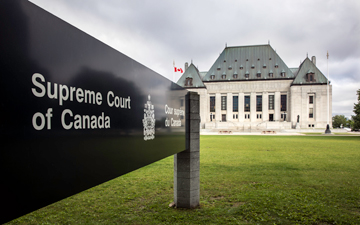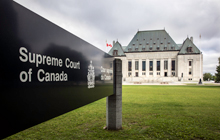What does Tax Court decide? What does Federal Court decide? Supreme Court clarifies jurisdictions

Through its decisions on Dow Chemical and Iris Technologies, the Supreme Court of Canada has clarified tax appeal jurisdictions, explains David J Rotfleisch
Introduction
 |
David J Rotfleisch, CPA, JD is the founding tax lawyer of Taxpage.com and Rotfleisch & Samulovitch P.C., a Toronto-based boutique tax law corporate law firm. |
On June 28, 2024, the Supreme Court released its decisions in Dow Chemical Canada ULC v. The King, 2024 SCC 23 (Dow Chemical) and its companion appeal, Iris Technologies Inc v. A.G. of Canada, 2024 SCC 24 (Iris Technologies). In both cases, the Supreme Court clarified the jurisdictional boundaries between the Tax Court and the Federal Court.
Both cases confirmed the Federal Court's jurisdiction over challenges to discretionary decisions by the Canada Revenue Agency. This article will further elaborate on the holding of these two cases and potential impact on taxpayers in dispute with the CRA.
Background Information
As a general matter, both the Tax Court and the Federal Court have authority over general tax matters. However, their scope of power differs upon a closer examination.
The Tax Court is a statutory court and empowered to review various tax matters, including, most notably, matters under the Income Tax Act, and the Excise Tax Act dealing with goods and services tax. It has no inherent jurisdiction and can only review appeals from CRA assessments made under these Acts.
On the other hand, the Federal Court is established to review decisions on diverse federal matters made by federal boards and tribunals. Tax law is a federal matter, as classified under s. 91 of the Constitution Act 1867, and the CRA is a federal administrative agency specializing in tax affairs. The Federal Court has the authority to review discretionary decisions made by the Minister of National Revenue but not appeals regarding tax assessments.
In addition to the difference in the matters that can be heard at the two courts, their scope of authority also differs by remedial power. The Federal Court has broad remedies when reviewing a CRA discretionary decision since it is empowered to compel the Minister to take, or refrain from taking, certain actions. However, compared to the Federal Court, the Tax Court can only "remit a decision back to the Minister to reconsider."
Tax Assessment vs Discretionary Decision
As a general matter, all tax decisions can be roughly divided into two categories, tax assessment decisions and discretionary decisions.
Tax assessment decisions are decisions concluding the amount of tax owed or refunds entitled to by a taxpayer. Tax assessments are highly objective and based on investigation and calculation that allow minimal discretion for individual CRA officials in the decision-making process. For example, assessing the amount of total income earned is a tax assessment decision.
A discretionary decision is when the CRA is allowed, by law, to have some leeway in deciding how to apply tax laws to specific cases. In these matters, the CRA is entitled to consider a wide variety of relevant factors, depending on the particular circumstances of each individual case. For example, the eligibility under the Voluntary Disclosure Program determination is a discretionary decision. As discussed above, discretionary decisions fall within the scope of authority of the Federal Court, where the Federal Court will assess whether the discretionary decision is "reasonable."
Dow Chemical and Iris Technologies
In Dow Chemical, the appellant taxpayer challenged a CRA decision of denying a downward transfer pricing adjustment under subsection 247(10). The Supreme Court clarified that the Federal Court has exclusive jurisdiction over discretionary decisions of the Minister under subsection 247(10), regardless of whether such a decision results in tax assessment. The Supreme Court rejected the argument that such a challenge can be pursued at the Tax Court for two reasons: (1) the Tax Court has jurisdiction only over outcomes, not the conduct of the Minister, and (2) the Tax Court is not equipped with proper statutory authority to grant the proper remedies.
In Iris Technologies, the appellant taxpayer challenged the CRA's audit of its GST/HST returns on procedural fairness grounds. The Supreme Court held that the "essential nature or true character" of the taxpayer's complaint is on the correctness of the CRA decision, instead of the exercise of the discretion, as alleged by the taxpayer. The main implication of Iris Technologies is that, when determining whether to allow an application to proceed, courts ought to focus only on the true nature of the taxpayer's allegation rather than the language the taxpayer used to phrase it.
Conclusion: The Powers of Each Court
To summarize, Dow Chemical and Iris Technologies confirmed the following. The Tax Court has the authority to review various tax matters, including assessments made under the Income Tax Act and the Excise Tax Act. The Federal Court can review discretionary decisions made by the Minister of National Revenue but not tax assessments themselves. In addition, the Federal Court has broader remedies when reviewing a CRA discretionary decision, while the Tax Court is more limited in the remedies it can provide.
David J Rotfleisch, CPA, JD is the founding tax lawyer of Taxpage.com and Rotfleisch & Samulovitch P.C., a Toronto-based boutique tax law corporate law firm and is a Certified Specialist in Taxation Law who has completed the CICA in-depth tax planning course. He appears regularly in print, radio and TV and blogs extensively. With over 30 years of experience as both a lawyer and chartered professional accountant, he has helped start-up businesses, cryptocurrency traders, resident and non-resident business owners and corporations with their tax planning, with will and estate planning, voluntary disclosures and tax dispute resolution including tax audit representation and tax litigation.
Visit www.Taxpage.com and email David at david@taxpage.com. Read the original article on Taxpage. Photo David Rotfleisch courtesy Rotfleisch & Samulovitch P.C. Title image: Supreme Court of Canada (iStock).











(0) Comments